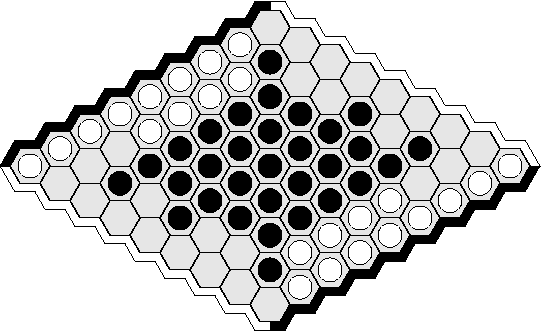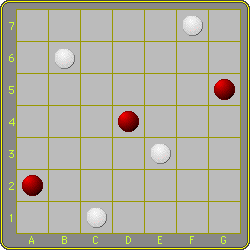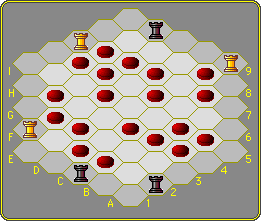 Author
Author |
Topic: Essay by Christian Freeling on inventing games (Read 547398 times) |
|
christianF
Forum Moderator
Forum Guru
    

Arimaa player #4019
Gender: 
Posts: 804
|
 |
Re: Essay by Christian Freeling on inventing games
« Reply #795 on: Dec 23rd, 2011, 8:54am » |
|
on Dec 22nd, 2011, 8:37pm, Eltripas wrote:| I used to think that this thread should be closed for the sake of the Arimaa Forum, now I think that it should be closed for the sake of humanity. |
|
With 80,000+ views, humanity doesn't seem to agree. Of course this may be for all the wrong reasons, but I'll take the risk.
|
|
 IP Logged IP Logged |
|
|
|
Boo
Forum Guru
    

Arimaa player #6466
Gender: 
Posts: 118
|
 |
Re: Essay by Christian Freeling on inventing games
« Reply #796 on: Dec 23rd, 2011, 11:55am » |
|
I don'y know what is "predictability of game behaviour".
How well would the game sell? How quickly will it get bored? Something else?
Anyway I guess this one might be of interest to you:
http://gen.lib.rus.ec/book/index.php?md5=D862FFE595CF2B38A62F05F555AA111 E
|
|
 IP Logged IP Logged |

|
|
|
MarkSteere
Forum Guru
    

Finite games rule

Gender: 
Posts: 289
|
 |
Re: Essay by Christian Freeling on inventing games
« Reply #797 on: Dec 23rd, 2011, 12:47pm » |
|
on Dec 23rd, 2011, 11:55am, Boo wrote:
Anyway I guess this one might be of interest to you: |
|
There are no books for what we do. Nor could there be. Such a book would no sooner be written than obsolete.
|
|
 IP Logged IP Logged |
|
|
|
christianF
Forum Moderator
Forum Guru
    

Arimaa player #4019
Gender: 
Posts: 804
|
 |
ract gamesto argue that
« Reply #798 on: Dec 23rd, 2011, 1:15pm » |
|
on Dec 23rd, 2011, 11:55am, Boo wrote:I don'y know what is "predictability of game behaviour".
How well would the game sell? How quickly will it get bored? Something else? |
|
Selling is not an issue to me, or to many other designers for that matter. Kris Burm would like to have that kind of predictability, no doubt, and I have no issues with that either. But his designs have commerce written all over it, and though they're not bad, they always feature 'special' equipment you wouldn't have lying around somewhere.
Whether players would get bored quickly is certainly an issue, but it may be subjective. It's about how a game would behave in the long run and I once trumpeted around that I could see that. Which wasn't quite true.
Yet I made quite a few games in seconds, literally. Grand Chess, Dameo and Sygo, none of which underwent any significant changes. Others took merely a few hours, Havannah, Emergo, Symple, Mu. Havannah and Emergo have been thouroughly tested, Symple and Mu haven't. That's a nice test. Symple also shows that it's easy to miss an essential point, as the recent rule change shows. Not an obvious point, but I shouldn't have missed it.
Anyway, I'd like to argue that the long term behaviour of some games can be predicted to a great degree, while for others it's near to impossible. Just to see if there's some workable division possible. I haven't all the answers, I'm merely organizing my thoughts.
on Dec 23rd, 2011, 11:55am, Boo wrote:
It certainly is, although my career as an inventor has come to an end. Ed and I are wrapping it up at mindsports.nl and Mu is our intended farewell gift to the abstract games community but it requires a more potent applet than the one we currently use, so I can predict my brains out  while Ed works on the applet. while Ed works on the applet.
|
|
 IP Logged IP Logged |
|
|
|
christianF
Forum Moderator
Forum Guru
    

Arimaa player #4019
Gender: 
Posts: 804
|
 |
Re: ract gamesto argue that
« Reply #799 on: Dec 23rd, 2011, 1:50pm » |
|
on Dec 23rd, 2011, 1:15pm, christianF wrote:| Others took merely a few hours, Havannah, Emergo, Symple, Mu. Havannah and Emergo have been thouroughly tested, Symple and Mu haven't. That's a nice test. |
|
Neither Symple nor Mu required any physical material. Symple materialized in one moment in half sleep, after thinking about it for a day or so. Mu materialized in a nightly bikeride home, after having been introduced to Martin Medema's monumental 'Atlantis' and concluding it was 'crooked'.
To make Symple simple, you have a Go board, two players (w&b). On your turn you either:
1. place one stone not (orthogonally) adjacent to a like colored one, making a new 'group', or ...
2. grow any or all (but at least one) groups by one stone.
When the board is full you get one point for every stone and are penalized P points for every separate group. P is even (the applet offers 2-12) so there can be no draw. Disregarding a balancing rule that's it. Think about it.
Mu is a territory game, a game of growth and movement, an elimination game and a connection game at the same time. It is one basic organism operating over a diverse terrain that takes shape and changes in the proces of playing. It has a fairly simple strategy but tactics of unparalleled complexity and resourcefulness. It's a multi player game that isn't collusionproof, but neither is life, and you wouldn't dismiss it for that. In Mu you can live, even if you're Mark Steere.
|
| « Last Edit: Dec 24th, 2011, 4:31am by christianF » |
 IP Logged IP Logged |
|
|
|
christianF
Forum Moderator
Forum Guru
    

Arimaa player #4019
Gender: 
Posts: 804
|
 |
Re: Essay by Christian Freeling on inventing games
« Reply #800 on: Dec 24th, 2011, 6:03am » |
|
Regarding the introduction of compulsory movement in Symple, I had already implemented it before Benedikt and Luis were convinced. Luis for instance wrote:
Quote:I've always thought the Symple concept should be more naturally implemented in a completely hot game, and there OC is a simple way to accomplish it: disallowing passing and removing "dead" groups (groups whose size is less than half the penalty) before counting. In this variant, empty areas would add to the surrounding player's score. This is the same as in *Star. Simply allowing passing isn't enough, as there could still be negative scores in failed invasions. I really hope the cold endgame dynamics in the current version actually improve the game, but maybe you should test both versions before settling on one or the other...
|
|
Benedikt wrote:
Quote:My comment is that the rule is interesting. Yet, I have two issues:
1. it changes a hot game to a cold game.
Being foprced to make moves, even if they hurt is the definition of zugzwang and a cold game. Cold games are fashionable at the moment, but I think it is being overused.
2. what difference does it make? |
|
These 'hot' and 'cold' issues, and 'fairly hot' and 'reasonably cold' are new to me. I replied Benedikt to that effect:
Quote:P.S. Hot, cold, what precisely is the big deal? In a game you get to do things you don't want, and whether hot or cold, that all eventually boils down to not wanting to resign.
In Draughts I don't want to be stuck in opposition: I don't want to move because it loses the game anyhow.
In Hex I can see I'm lost: I don't want to move because it loses the game anyhow.
Same with finite and infinite, draws or no draws, I tend to look at the 'organism' (read mechanism and, preferably implied, purpose) and see where it goes. If it's hot it's hot, if it's cold it's cold, I don't care as long as it's focused on intent and behaves properly. |
|
This as a sideline. I do indeed see a dominant view in abstract game inventing lately, with the main proponent deserving at least the Nobel Prize for it, in his own perception, but the philosophy behind it can be written on the backside of a matchbox.
Back to Symple. What difference does it make? No difference in unbalanced games, but unbalanced games aren't interesting. It gets really interesting if and when games are close. Here's Benedikt's next mail and my reply:
Quote:So, the current information is: the rule will matter when the game is close. The question is then whether it will be a tool or a "randomizer".
Please get me right. I am not against it, I am "her majesty's loyal opposition". And the decision about the ruleset is yours anyhow.
Sure but I'd like it if we'd agree. It was the process really. In fact Luis' objection was only a tournament technicality. But it inevitably made me consider forced movement and I immediately saw the drama I had missed all the way - and that I had testified to so often. The following thoughts were:
1) 'this is deep endgame stuff with fairly long term planning' ('shape' and such) that dramatizes the outcome in balanced games, and
2) you'd have to go easy on the growing sometimes, relatively small sacrifices to give forced moves some 'range' (i.e. you don't want to be forced to create a new group, make sure you get some timely arrangements) and
3) 'this is the true spirit of group penalty', however nicely it affiliates with the Go like interpretation it has now.
Remember that it was veiled by a 'connection' interpretation for quite some time too, without it leading to games that were actually bad. But they suffered from thematic pollution just the same.
Finally, it made the applet count precise at all times. I had to surrender  |
|
And that was the main insight: "group penalty" as a naked theme has been very elusive, hiding first in "connection" (Star, Superstar, *Star and Yvy) and then, even when I thought I had everything 'alien' removed, in "territory". Luis suggested to remove 'dead groups', Benedikt and I were satisfied with leaving them on the board, contibuting to the count, and add 'vacant territory' to the surrounding player. It was all a bit lame and lacking drama in the end. You could probably predict a winner in any less than balanced game from miles away.
Not any more. Instead of being mere 'vacant territory', these pockets become traps ready to receive compulsory invasions. Keeping sufficient growing options in the endgame is now vital.
Hey, I'm predicting stuff 
|
|
 IP Logged IP Logged |
|
|
|
christianF
Forum Moderator
Forum Guru
    

Arimaa player #4019
Gender: 
Posts: 804
|
 |
Re: Essay by Christian Freeling on inventing games
« Reply #801 on: Dec 24th, 2011, 7:57am » |
|
5.
on Dec 23rd, 2011, 7:14am, christianF wrote:But take Hex, Go, Othello, Emergo, Yodd, Symple or Oust, all uniform and organic game systems, and long term perdictability can be based on the observation that these games have nowhere to go but deeper.
...
The one thing that has been flagrantly disregarded here is turn-order balancing rules and mechanisms. |
|
So let's disregard chess and draught variants. Uniform and 'organic' game systems are easier to predict, and within these quintessential games and finite are even easier, the first because they're more or less self explanatory and tend to resist modifications, the latter because they go from A to B with a predictable result. 2x30 moves max in Othello and you've got a win, a draw or a loss. If the thing is balanced, strategy can only go one way: deeper.
If the thing is balanced - that's a big one, especially in drawless games, where any move in any position is either winning or losing.
There are quite a few balancing systems and I'm probably I'm far from complete here. In fact there are two questions: 1. which games need them, and 2. which form might they take?
Not all games need balancing mechanisms. In games with a tactical nature, capriciousness is sometimes enough to blur out any notion of turn order advantage. Othello might serve as an example. It's not wholly tactical, because there are some advantageous subgoals to be reached, and that's probably the reason for the lasting interest. But it's highly tactical and I've never heard of any turn order advantage.
Some games may be strategic but with any perceivable advantage lost in longiloquence. If you enter a bicycle race from Berlin to Paris, a couple of yards for a headstart don't really matter. Try Tanbo for an example. Be sure to take enough provisions.
For those games that for whatever reason need a balancing mechanism, what do we have. That's not rethorical - I'm sure this list will be far from complete, so please post what you feel is missing:
1. Pie (Hex, Havannah, others)
2. Extended pie/Marquisian Method (Pylyx, InSight, Swish & Squeeze)
3. Initial move restrictions (Renju et all, Hexade, others)
4. The 1-2-2 move protocol (Connect6, Yodd, others)
5. The 1-2-2(3) move protocol (Ketchup)
6. Komi (Go, variants)
7. The Symple protocol (Symple, Sygo)
You can find most of the above games at mindsports.nl usually with external links to appropriate sites.
|
| « Last Edit: Dec 24th, 2011, 7:59am by christianF » |
 IP Logged IP Logged |
|
|
|
MarkSteere
Forum Guru
    

Finite games rule

Gender: 
Posts: 289
|
 |
Re: Essay by Christian Freeling on inventing games
« Reply #802 on: Dec 24th, 2011, 1:19pm » |
|
on Dec 24th, 2011, 6:03am, christianF wrote:
I do indeed see a dominant view in abstract game inventing lately, with the main proponent deserving at least the Nobel Prize for it, in his own perception, but the philosophy behind it can be written on the backside of a matchbox. |
|
Your knowledge of game architecture can be written on a matchbox, Christian, in large print, with plenty of room to spare.
|
|
 IP Logged IP Logged |
|
|
|
MarkSteere
Forum Guru
    

Finite games rule

Gender: 
Posts: 289
|
 |
Re: Essay by Christian Freeling on inventing games
« Reply #803 on: Dec 24th, 2011, 2:13pm » |
|
on Dec 24th, 2011, 7:57am, christianF wrote:
Try Tanbo for an example. |
|
No game has more fabulous architecture than Tanbo. But it's a little boring to play. Or it was, I should say. Enter Arty Sandler. Arty suggested and implemented a smaller board (13x13 down from 19x19), packing the initial 16 stones more densely. Huge difference. Thanks Arty 
And yes, Tanbo is still a long game, even at that size. 140 turns isn't unusual. But so what? Why the big premium on "shortening games"? Sure, if your game is crap, shorten it.
Tanbo owes its extraordinary balance to three things: pseudo cycling, lengthiness, and good luck. You never know a game's balance until you play it out and gather stats - unless you're Christian Freeling 
|
|
 IP Logged IP Logged |
|
|
|
christianF
Forum Moderator
Forum Guru
    

Arimaa player #4019
Gender: 
Posts: 804
|
 |
Re: Essay by Christian Freeling on inventing games
« Reply #804 on: Dec 24th, 2011, 2:33pm » |
|
We've been asked permission by the organizers to use Symple as the game for the 2013 CodeCup Challenge, a permission we're happy and honored to give of course.
MindSports has provided a game before. In 2003 Caïssa was the featured game, but programming Caïssa, in our opinion, is a piece of cake compared to programming Symple.
This hopefully will help propel Symple into the "touchstone' section of AI development, where we foresaw a place for it right from the beginning.
|
|
 IP Logged IP Logged |
|
|
|
christianF
Forum Moderator
Forum Guru
    

Arimaa player #4019
Gender: 
Posts: 804
|
 |
Re: Essay by Christian Freeling on inventing games
« Reply #805 on: Dec 25th, 2011, 8:14am » |
|
6.
on Dec 24th, 2011, 7:57am, christianF wrote:| 1. Pie/Swap (Hex, Havannah, others) |
|
In finite drawless games, any opening move is either winning or losing. The pie is based on a human perspective. Although we know that a move 'on offer' is either winning or losing, we don't usually know which is which. And even if we do, that may not bring us any further.

Here for instance all black cells are winning for black and the white ones lose. The image is from the University of Alberta Computer Hex Research Group.
A bot knows a move is winning because it has checked all the lines originating from it. We know it because the bot proved it but without the lines, that's pretty stale knowledge. Two bots playing against one another on the above board wouldn't have any use for a swap. The swap is based on human inability to know the truth. We have to rely on intuition or at best on human knowledge about the general division of winning and losing moves, like the above diagram.
There are some conditions for a pie to work. First and foremost a game must have 'questionable' opening moves, and preferably also bad ones, to allow a range of 'questionables'. Even the bots have their 'questionables', but in Hex they're nibbling them away at a steady pace. Here's where they were a couple of month back:

The grey cells aren't solved yet, but they undoubtedly will be in the near future. Note the general division: in 8x8 exactly half the moves win, and both divisions suggests that generally speaking black opening moves near the black sides are losing. That's the kind of knowledge one can extrapolate on.
If there are no bad opening moves, a pie doesn't work. In 9x9 Slither for instance, you can safely swap any opening move because even corners are good - this is a recognized problem in the game. Scaling may come to the rescue, and winning a game of Slither is not an easy task in the first place, so a pie on 13x13 may well be effective, for the time being.
But scaling may not be as effective as one would hope if the division of winning and losing moves is off balance. John Forbes Nash' non-constuctive proof that Hex is a win for the first player can word for word be applied to Atoll.

The question would be however, whether the winning and losing moves are as evenly divided as in Hex, both in number and in their distribution. There are for instance no clear sides to stay away from. A pie might not work, which led the inventor to omitting it altogether because, I quote, it doesn't need one. Never mind John Forbes Nash. 
Generally speaking a Pie is very effective if the conditions for it are met, which actually isn't all that often. Whether or not the game can end in a draw, or even whether it is finite or not, is hardly an issue.
|
| « Last Edit: Dec 25th, 2011, 9:50am by christianF » |
 IP Logged IP Logged |
|
|
|
christianF
Forum Moderator
Forum Guru
    

Arimaa player #4019
Gender: 
Posts: 804
|
 |
Re: Essay by Christian Freeling on inventing games
« Reply #806 on: Dec 25th, 2011, 9:02am » |
|
7.
on Dec 24th, 2011, 7:57am, christianF wrote:| 2. Extended Pie / Marquisian Method |
|
An extended pie offers a player basically the same choice - accept the last made move as your own, or move against it - but with more pieces on the board. Here's a basic expample:

Player One made a position with 4 white and 3 red stones, each occupying a free row & column. It's red to move now. Player Two next decides whether he will play white or red. If he chooses white, then it's Player One's turn to move, if he chooses black, then it's his turn to move. To understand the principle, one doesn't even have to know the rules.
The 'Marquisian Method' differs in that the color to move has not yet been estabished:

This is a bead capturing game (or 2 actually). Player One made a position with 3 white and 3 black rooks, all on the edge, and 19 beads in the inner area. Capture ten.
The choice for Player Two is either to move first, in which case Player One chooses which color he will play, or to play with a particular color, in which case Player One moves first. This slightly favors Player One, because he can make an indeep study of the position, while weaving all kinds of tactical tricks into it. So it isn't really a balancing mechanism. But its fun. 
Although an extended pie is widely applicable, it's not widely used. It's main advantage is what one could call a 'higher resolution': there are far more positions possible than with a simple pie, and studying specific openings indeep, a common strategy in Hex, usually isn't possible because of the sheer number of them. But one could as well argue that this is the main disadvantage. Imagine Chess with an extended pie rule. Like Fischer Shuffle Chess it would eradicate any need for opening preparation. But would Chess players want that?
|
| « Last Edit: Dec 25th, 2011, 9:47am by christianF » |
 IP Logged IP Logged |
|
|
|
MarkSteere
Forum Guru
    

Finite games rule

Gender: 
Posts: 289
|
 |
Re: Essay by Christian Freeling on inventing games
« Reply #807 on: Dec 25th, 2011, 10:30am » |
|
on Dec 25th, 2011, 8:14am, christianF wrote:
If there are no bad opening moves, a pie doesn't work. |
|
Wrong, professor Weinerschnitzel. With pie, you select the first move with the smallest absolute value of advantage, whether positive or negative. In your Hex diagram, the correct first move might very well be a black cell - a "good" opening move.
There's no requirement whatsoever of "bad opening moves" for the pie rule to work.
on Dec 25th, 2011, 8:14am, christianF wrote:
Whether or not the game can end in a draw, or even whether it is finite or not, is hardly an issue.
|
|
Except for you, Christian, lol
|
|
 IP Logged IP Logged |
|
|
|
christianF
Forum Moderator
Forum Guru
    

Arimaa player #4019
Gender: 
Posts: 804
|
 |
Re: Essay by Christian Freeling on inventing games
« Reply #808 on: Dec 25th, 2011, 10:39am » |
|
8.
on Dec 24th, 2011, 7:57am, christianF wrote:| 3. Initial move restrictions |
|
N-in-a-rows are famous for fun and first player advantage. If they're taken too seriously, the whole circus may go downhill in a frenzy of modifications fueled by some perceived importance. Consider Renju and let me quote:
Quote:Unlike Gomoku, Renju has a unique sequence of opening moves:
1. The first player places 2 black stones and 1 white stone on the board.
2. The second player now chooses whether to play black or white.
3. White then places one more stone on the board.
4. Black places 2 stones on the board.
5. White removes one of the two black stones from the previous move.
6. White places a white stone.
After this sequence is complete, Black and White continue to take turns to place their stones.
The Extra General Assembly of Renju International Federation in 2008 created 3 new sets of rules for openings that are to replace the above old sequence of moves: Soosörv, Taraguchi, and Yamaguchi. Also a rejection system for their use was approved.
There are certain moves that Black is not allowed to make:
1. Double three - Black cannot place a stone that builds two separate lines with three black stones in unbroken rows (i.e. rows not blocked by white stones).
2. Double four - Black cannot place a stone that builds two separate lines with four black stones in a row.
3. Overline - six or more black stones in a row.
Black can win the game only by placing five black stones in a row (vertically, horizontally or diagonally).
White can win by either:
getting five (or more) white stones in a row
forcing Black to make a forbidden move (see above). |
|
An extended pie of sorts, followed by a truckload of restrictions, have fun. 
Restrictions are necessary by the nature of a ruleset, but that should never be an invitation to indulge in their bluntness. If necessary, they should be applied with minimal intrusion. Hexade puts a slight restriction on the first player at his second move. Emergo for the first player on his first move. For initial move restrictions to work at all, this is about the extend to which they should go.
|
| « Last Edit: Dec 25th, 2011, 10:40am by christianF » |
 IP Logged IP Logged |
|
|
|
christianF
Forum Moderator
Forum Guru
    

Arimaa player #4019
Gender: 
Posts: 804
|
 |
Re: Essay by Christian Freeling on inventing games
« Reply #809 on: Dec 25th, 2011, 12:56pm » |
|
9.
on Dec 24th, 2011, 7:57am, christianF wrote:| 4/5. The 1-2-2 or 1-2-2(3) protocol |
|
This is a very generic and reasonably fair move protocol, that could for instance be adapted for Chess or Draughts or even Go. Not, in those cases, without regulating check or capture, but possible all the same. The much wilder Progressive Chess testifies to that.
But by its nature it favors a race, in particular by placement, because numerical the last player will always be in the lead. The best known example is Connect6, which has proven to be quite fair in the long run. And that's not much of a surprise. I dare say that two recent inventions, Luis Bolaños Mures' Yodd and Nick Bentley's Ketchup will turn out to be equally balanced.
Nick extended cleverly on the 1-2-2. In Ketchup, if you take the lead in terms of achieving the object (which is creating the largest group), your opponent gets to move 3 instead of 2 on his next turn. So here the balancing system provides extra negative feedback that extends over the length of the game.
|
|
 IP Logged IP Logged |
|
|
|
|